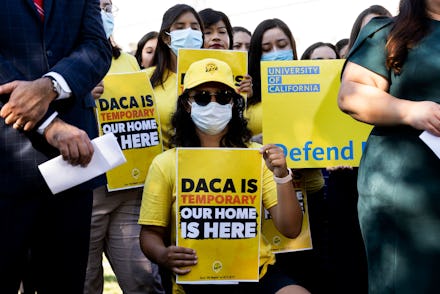The Biden administration just took a big step to protect DACA
The contentious program shielding young immigrants from deportation might stand a little stronger now.

For years, the United States’s xenophobia has taken shape through consistent attacks on the Deferred Action for Childhood Arrivals (DACA) program. Now, though, the Biden administration is finally taking steps to preserve DACA, and potentially protect it from future political and legal challenges. Although more can be done to protect DACA recipients, it’s a step in the right direction.
Since its inception in 2012, DACA has assisted over 800,000 people. Data from U.S. Citizenship and Immigration Services shows that as of March 31, 611,270 people were still enrolled in the program. But throughout its existence, DACA has only been governed by an executive memo, making the program especially vulnerable.
On Wednesday, the Department of Homeland Security announced it had finalized a rule to officially codify DACA. In a press release, Secretary of Homeland Security Alejandro Mayorkas said, “Today, we are taking another step to do everything in our power to preserve and fortify DACA, an extraordinary program that has transformed the lives of so many Dreamers.”
“Thanks to DACA, we have been enriched by young people who contribute so much to our communities and our country,” Mayorkas continued. “Yet, we need Congress to pass legislation that provides an enduring solution for the young Dreamers who have known no country other than the United States as their own.”
Per DHS, the 453-page rule continues the DACA policy as it was announced in 2012. This includes maintaining the same eligibility rules: Applicants need to prove they arrived in the U.S. by 16 years old and before June 2007 and have no serious criminal record. They also need to have gone to school in the U.S. or served in the military.
As of now, the new rule is set to take effect on Oct. 31. However, there are some pre-existing legal challenges to DACA that may cause issues. In July 2021, a Texas federal court ruled that DACA is unlawful. Per the Council on Foreign Relations, U.S. District Court Judge Andrew Hanen claimed that former President Barack Obama exceeded his authority when he created DACA through an executive order.
Under Hanen’s decision, the Biden administration was directed to stop granting new requests. In its press release, DHS noted that as long as the decision remains in effect, it still cannot grant initial DACA requests, or any related employment authorization.
That means that even with the Biden administration’s actions this week, the fight is not over. Democratic lawmakers, specifically, are pointing to passing the DREAM Act as the next necessary step. On Twitter, Sen. Michael Bennet (D-Colo.), wrote, “This action is a step toward better supporting [Dreamers]. In the Senate, I’m fighting for a long-term solution for DACA recipients as we work to pass the DREAM Act.”
In a statement about the new rule, Biden said, “We are fulfilling our commitment to preserve and strengthen DACA by finalizing a rule that will reinforce protections, like work authorization, that allow Dreamers to live more freely and to invest in their communities more fully.”
He went on to urge Republican lawmakers to “stop blocking a bill that provides a pathway to citizenship for Dreamers. It is not only the right thing to do, it is also the smart thing to do for our economy and our communities.”